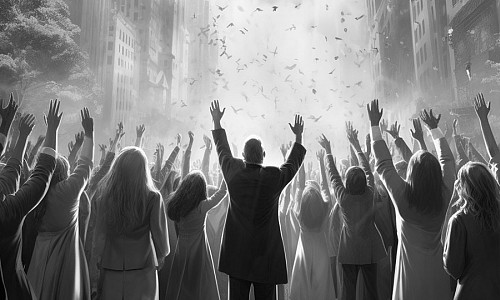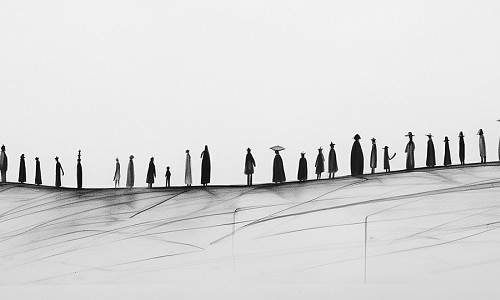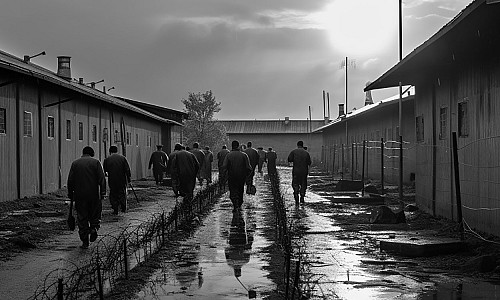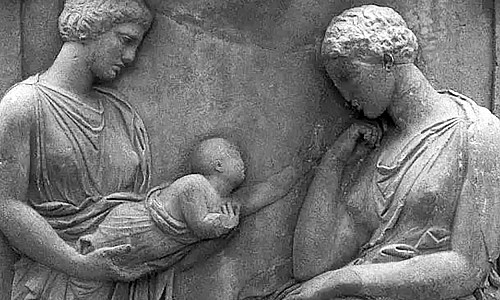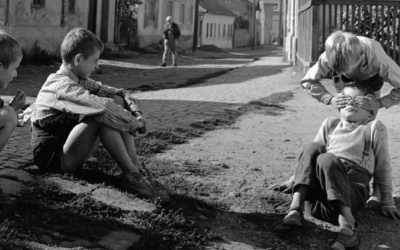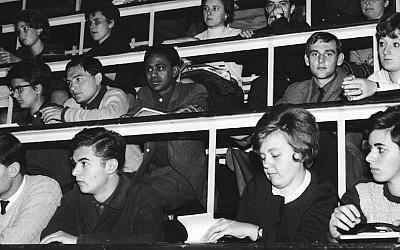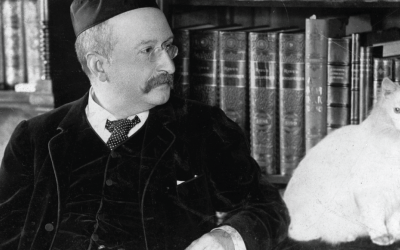Stephen Mumford argues that sport's importance lies in the connections between embodiment, power and freedom.
With dexterity verging on the simian the gymnast swings around the parallel bars. Few human beings are capable of the movements performed but years of training and dedication can enable it. The audience gasp as it seems at times as though gravity is defied. There is a swing high into the air, a mid-air summersault, and then a grasping of the bar as the body falls. Those watching see a pinnacle of mortal achievement, the gymnast attaining as close to superhuman as the human form permits. But what is the point?
Why do we bother with sport? Its contests are pointless it seems. Why jump over the bar when, if one wants to get to the other side, it would be easier to walk under it? And why do eleven players toil in all-weather to force an inflated sack of air between the other eleven’s goalposts? Why strain so hard to stop the opposition? Why not let the others get what they want? It hardly hurts your goals to have a ball shot into them. We could all just give up, go and sunbathe or enjoy some other form of relaxation. And why on earth would anyone want to knock balls into pockets with a long stick called a cue? Surely if it’s so important that the balls be in the pockets one could put them in more efficiently with one’s hands. But, of course, it matters not at all that the balls are in the pockets. The green table looks much prettier with them on.
Sport seems entirely without purpose. There can of course be health benefits to the playing of sport but that’s not what it is about. Fitness can be attained in more efficient ways and high-level sport is often unhealthy when the body is forced to the very limits of its capability. Some use sports clubs to socialise, but friends can be made in other ways. So why do we bother putting all this effort into pointless activities? And perhaps it is even more mystifying why so many people spend so much of their time and money watching athletes conduct their meaningless tasks.
But the answer, I would argue, is that sport isn’t meaningless, and the fascination so many have with sport and the heights of human attainment is a well-placed one. That sport sees athletes conduct a series of superficially pointless activities is a good clue that there must be something really quite profound behind it. Let us stick with the example of the high jump. There would be no good reason to go to all that trouble to jump the bar if the aim was merely to get to the other side. The point must, therefore, be something else. And given all the trouble it takes to be able to perform the task, and the interest the spectators take in seeing it performed, it is obvious there is something very important to sport.
In my view the greatest book in the philosophy of sport is The Grasshopper by Bernard Suits, which is subtitled Games, Life and Utopia. An important distinction is drawn between the prelusory and lusory goals of game playing. The prelusory or pre-game goals will almost always be pointless: getting balls in holes, jumping over bars and so on. But what gives them their meaning is that, along with a set of rules, they make game-playing possible. And that is where we find the important stuff. The lusory goal is the goal within the game playing. Hence, in high-jump, the lusory or game-goal is that one gets to the other side of the bar by jumping over it, without knocking it off its stand. In snooker, the lusory goal is to sink the balls into the pockets within the limits of a range of possible sequences, with a cue, and without committing any of the proscribed fouls, acquiring a higher number of points than the opponent. The reason we submit ourselves to this regiment of rules is so that we are able to play the sport. This is what people are interested in doing and watching. To think of sport as a complete waste of time is, I suspect, to think only of it in terms of its prelusory goals. If one thinks of lusory goals one sees that we are prepared to make strenuous efforts and submit to rigid sets of rules in order to make sport possible.
So why do we want to play and watch sport? The answer might be quite profound. We are, needless to say, embodied beings. We possess a range of physical and mental abilities. We also are able to learn; in other words, we have an ability to acquire further physical and mental abilities. This gives us a whole host of possibilities. We can run and jump, perform skilled and delicate movements and we can formulate strategies for the attainment of our aims. We can think-up elaborate systems of rules and we can perform a whole series of tasks in an intricate order to stay within them. Many of these abilities are helpful for survival and health. We can feed ourselves and avoid danger, for instance. But there are also many things of which we are capable that are not especially practical.
The more that we understand our capabilities, the more that we understand our condition as embodied and empowered beings. Power is freedom, for instance. When I am capable of playing the piano or throwing a javelin, I have a freedom that is not available to those who are without those abilities. The exercise of those powers is thus an expression of our freedom. This coheres with a positive conception of liberty, as described by Isaiah Berlin in his essay “Two Concepts of Liberty”. On the negative conception, freedom is just the absence of restraint. Hence I am free to play the piano, on this conception, just because there is no law banning me from doing so. But it is in having the power to do something that real freedom is found, on the positive conception, and one thus becomes more free as one acquires more powers. Someone capable of jumping two metres is more free than someone who is capable of jumping only one, for they have more possibilities open to them.
And there is something else important about our bodily and mental powers. They are also satisfying to exercise. Hence, while Javier Sotomayor has probably never had any practical reason to jump 2.45 metres – to escape a danger, for instance – it was also the defining moment of his life that he did. When he successfully exercised that ability, and set a high jump world record, he was displaying the maximum degree so far of a capability that the rest of us have only to a more limited extent. The notion that one often does something for no other reason than that one can is valid. One will sometimes sing a song, solve a mental problem (consider Sudoku), and complete a physical task for no other reason than that one can. This is enough because it is satisfying to do so. And we understand more about the human condition of embodiment when we see what the limits of those powers are. Just what is the human being capable of? What is the fastest we can run 100 metres; how high could we jump, and how much can a person lift? We want to know. And these abilities are enshrined in the Olympic motto: “Faster, Higher, Stronger”.
The pointless prelusory goals of sport thus indicate that its ultimate purpose is to provide an opportunity to exercise our abilities, presumably because it is pleasurable to exercise them and it reveals the extent of human freedom. Necessity is often our enemy. If one has to exercise a power, as a matter of survival, for instance, then the pleasure in the exercise is lost even if there is pleasure in a positive outcome. Being forced to play the piano, for example, is no fun, nor jumping to save one’s life. The exercise of the powers must be a voluntary activity, and it is indeed a basic principle of sport that the participants are consenting, as opposed to the Christians that were thrown to the lions. Similarly, tasks that one performs willingly for fun can become a chore when they are required, in employment for instance.
The athlete is at liberty to enjoy their sport precisely because nothing ultimately rests on the outcome. Suppose, for instance, that a cure for cancer rested on the sinking of a golf shot. It would be deemed wholly inappropriate – callous even – if someone who knew this nevertheless enjoyed the attempt (the result of the attempt being a separate matter). There would also be something slightly psychotic or maladjusted if someone enjoyed playing a game for their life: so-called Russian roulette, for instance.
And so it is also for the watching of sport. The fact that its prelusory goals are not serious allows us to view it as entertainment. At times that is frivolous; though often it involves a more serious commitment of the fan who builds a life-long interest in a sports team. What licenses it as a form of entertainment, and at times a source of aesthetic pleasure, is that nothing really hangs on it. Spectators were wrong if they enjoyed watching the Christians fight lions for their lives. That was far too serious a matter to enjoy as sport. Andy Dougan’s Dynamo tells the story of Kiev’s infamous “death match” that the Ukrainians played against Nazi Luftwaffe. It would have been wrong to have treated that game as a spectacle, knowing the context. The locals were playing under a form of duress, for their honour, and paid the ultimate price when they protected it. Similarly, I can contemplate the aesthetics of the long-jumper when they fully extend their body trying to win the competition; but it would be inappropriate of me to seek or enjoy any aesthetic value if watching a similar bodily form that is hurdling over a life-threatening flow of burning lava. Triviality permits aesthetic enjoyment, and this is what many seek in watching sport.
There are, of course, other ways in which we may learn about the embodied powers of persons but the triviality of sport is what permits spectatorship for this specific set of activities. In physical labour, for instance, we often show the limits of our capacities. But a man shovelling sand does not want a crowd to watch, even though they might learn from doing so. Being forced to shovel sand for wages is not an expression of one’s freedom. The sand is being moved for a good reason, presumably, and the labourer performs that task only because they need the salary. In comparison, there could be a pointless sand shovelling contest in a world’s strongest man competition, for instance, and that would be a legitimate activity for spectatorship. In high-level sports, no one seems even to want to perform in private, even if they could ask to do so. The other sphere in which one exercises physical powers – taking great pleasure in doing so – but wants to do so without an audience, is in sex. Presumably the reason for this is that it is far too important a matter – too close to the participant’s heart – to treat it as a matter for spectators.
The idea that the exercise of an ability brings pleasure, is taken further into the realm of the metaphysical by a major theme in Suits’ Grasshopper. One may begin with the idea that sport is stupid and pointless, but although it has little instrumental value, it is plausible that it is high in intrinsic value. Suits invites us to consider how we would live our lives if all our material needs were met. If we had all the food we needed and all the possessions, having no necessity for work, how would we spend our days. The answer that suggests itself is that we would do philosophy and play games, for these are the things that we do for their own sake rather than for anything else, more valuable, that they get us.
When we play games, we pit our powers against those of others. We enter into an artificial contest that encourages us to play to the best of our abilities. And I take sport to be the institutionalised version of game-playing, with more emphasis on the exercise of physical capability. Sport is thus an activity in which the maximum display of power is valued and the rules of the game reward with victory the most successful display. The contest is artificial in order to solicit this power maximisation. We participate simply because we enjoy doing so not because it gets us anything more useful. Metaphysical speculation offers this too, as well as understanding, which is also of intrinsic value.
I might be thought to be taking a rosy view of sport. It is of course often corrupted, especially by money and professionalism. A competitor might play sport not for its intrinsic rewards but for the money and fame. These are bad if they are the only reasons to play sport. A former professional footballer told me that it wasn’t only the amateurs who were playing for the love of the game. He loved the game too, he just happened to be also well-paid at the same time. Without enjoying that intrinsic value, the sports participant is in wage-slavery like the rest of us.
I began by asking whether sport was profound or a complete waste of time. I hope I have given some good reasons to opt for the former. I think I have also explained why some people mistakenly believe sport to be pointless. That is wrong, I say. But the seeming pointlessness is revealing. There must be some good underlying reasons why sport fascinates us so much and also why it attracts so many participants. Those answers lie, I suggest, in an understanding of embodiment, powers – otherwise known as capabilities – and their connection with freedom.
Finally, it is worth noting how little sport and philosophy have connected. Perhaps this is because the physical powers in sport have nothing to do with the cerebral matters of philosophy. But this is a mistake. Sport has a lot to tell us about human existence, I would maintain, and if philosophers neglect our physicality then they have only a partial picture of our natures. Fortunately, recent decades have seen rapid growth of interest in the philosophy of sport, which now has International, European and British Associations. The start has been made even though the discipline is in its relative infancy.
Stephen Mumford is Dean of the Faculty Of Arts at the University Of Nottingham and Professor of Metaphysics in the Department of Philosophy.He is currently working on free will with Rani Lill Anjum, writing a book called 'The Power to Will' for Oxford University Press.
You might also like...

Subscribe to The Philosophers' Magazine for exclusive content and access to 20 years of back issues.



